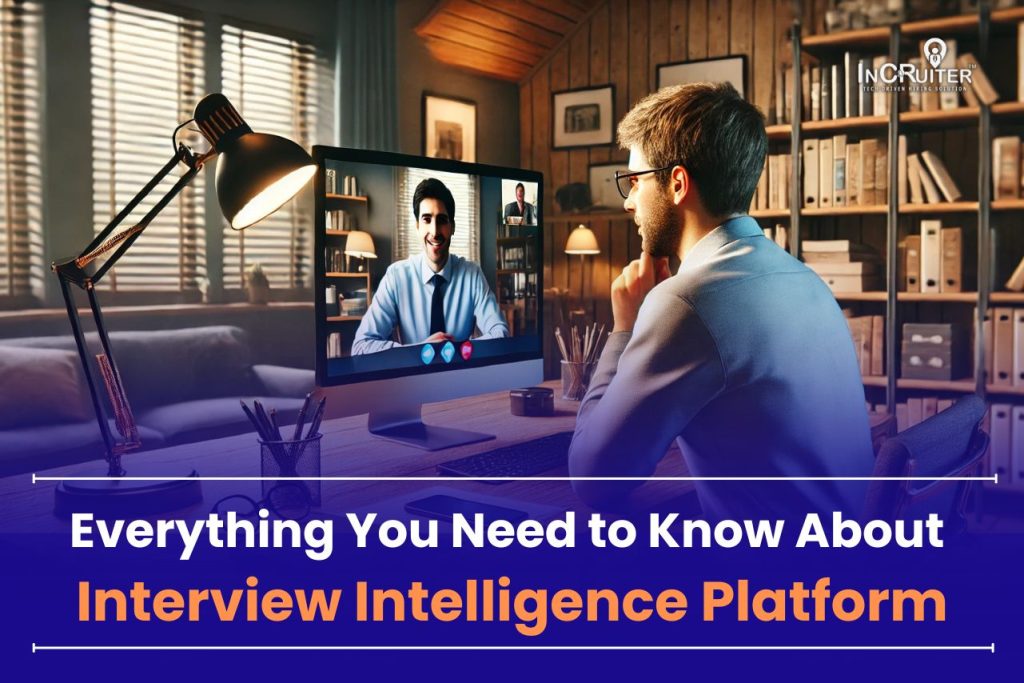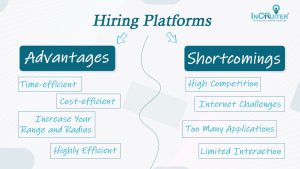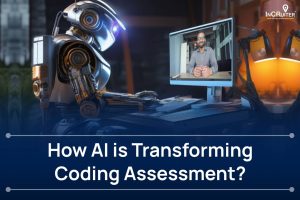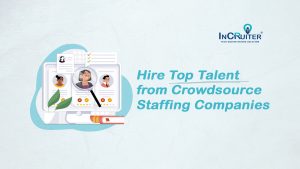
Did you know that IBM reduced its time-to-fill by 30% and cost-per-hire by 40% using the Interview Intelligence platform? That’s the power of combining data, structure, and technology in modern hiring. Selecting the right person isn’t just about scanning resumes. It’s about understanding how well a candidate fits the role, the team, and the organization’s larger goals. Traditional interviews often miss that mark. They’re filled with inconsistencies, gut feelings, and unintentional bias that can lead to poor decisions and lost talent. Interview Intelligence platform solves this by bringing in structure, emotional awareness, and AI-driven insights.
In this blog, we’ll explore what Interview Intelligence is, why it’s essential, and how it’s shaping the future of smarter, fairer hiring.
What Is Interview Intelligence?
Interview intelligence is a smart technology used during virtual interviews to understand candidates better and make informed hiring decisions. It works by capturing the entire interview session, converting spoken words into text, and analyzing how the candidate responds. This includes checking their tone, clarity, confidence, and how well they answer questions. The system also tracks speaking time, question coverage, and conversation flow. Instead of relying only on human memory or opinion, recruiters get real insights supported by data. Interview intelligence in virtual interviews helps improve fairness, reduces bias, and ensures every candidate is evaluated with the same level of detail.
The Evolution of Interview Intelligence Platforms: From Virtual Calls to Smart Evaluations
1. Early 2000s – Virtual Interviews Begin
In the early 2000s, virtual interviews started gaining traction with the introduction of tools like Skype and Google Meet. These interviews helped companies save travel time and conduct initial screenings remotely. However, the process remained entirely manual. Recruiters still had to rely on memory or handwritten notes. There was no technology to capture responses or evaluate a candidate’s communication quality. This phase laid the foundation but lacked analytical depth and consistent evaluation methods to support smarter hiring decisions.
2. Mid to Late 2010s – Rise of Recruitment Tech
Between 2015 and 2018, recruitment technology saw major growth. Applicant tracking systems became widely adopted to streamline hiring workflows. Automation started reducing manual screening efforts, but interview evaluations were still unstructured. While companies used technology to manage resumes and applications, interview feedback continued to depend on subjective impressions. This period highlighted the need for more reliable tools to analyze verbal responses and decision-making during interviews. It marked a critical step toward developing platforms focused on performance evaluation during candidate interactions.
3. 2015 Onwards – AI and NLP Integration
From 2015 onward, interview intelligence platforms evolved with the integration of artificial intelligence and natural language processing. These technologies enabled systems to transcribe spoken words into structured text, analyze sentiment, detect communication patterns, and extract meaning from conversations. The goal shifted from recording interviews to deeply evaluating how candidates express themselves and solve problems. For the first time, hiring managers could measure interview performance through data rather than just opinions. This brought early versions of automated evaluation into the recruitment process.
4. Emergence of Interview Intelligence Platforms
As AI technology matured, dedicated interview intelligence platforms emerged. These platforms could now record video interviews, generate accurate transcripts, and track various performance indicators such as confidence, clarity, and response time. Candidate evaluation became more structured and repeatable. Recruiters received visual dashboards with detailed insights, reducing reliance on scattered notes or inconsistent judgments. This development brought a massive shift from gut-based hiring to evidence-based decision-making. It provided consistency across interviews and allowed for fair comparisons among multiple candidates for the same role.
5. Use in Technical Hiring
Interview intelligence became especially valuable in technical hiring. These platforms helped evaluate not just what code was written, but how the candidate explained logic and approached problem-solving. Recruiters could observe communication style, reasoning flow, and attention to detail during coding sessions. Responses were captured and analyzed, making it easier to compare candidates beyond code output. This enabled structured assessments of both technical and soft skills in one setting. For tech roles, it eliminated guesswork and supported fairer, data-driven hiring decisions across teams.
6. Present Day – Smart, Scalable Hiring
Today, interview intelligence platforms are deeply embedded in recruitment ecosystems. They integrate with applicant tracking systems, video conferencing tools, and coding test platforms to centralize all interview data. Recruiters now have access to transcripts, analytics, and candidate scoring—all in one place. These tools support faster decisions and provide measurable evaluation criteria for every interview. As hiring demands grow, interview intelligence enables companies to scale without sacrificing quality. The focus has fully shifted from convenience alone to accuracy, fairness, and continuous hiring improvement.
Also read: AI Interview Adoption in the Recruitment Process
Key Components of Interview Intelligence
Interview Scheduling System
Interview Intelligence platforms begin with a powerful scheduling system designed for volume efficiency. Recruiters can upload multiple candidate resumes in bulk, where the system uses resume parsing algorithms to extract key fields like name, contact, and experience. Once parsed, AI automatically maps the data to structured fields for streamlined interview setup. From there, single or bulk interview links are generated instantly, eliminating the need for repeated manual outreach. This scheduling automation not only reduces human effort but ensures a scalable, error-free experience in fast-paced hiring environments.
AI-Based Question Generator
At the core of any intelligent interview system is a question generator powered by artificial intelligence. This engine analyzes the job description and candidate profile using natural language processing and semantic matching techniques to create customized, role-specific questions. It supports both structured and adaptive question sets tailored to skill depth, seniority, and industry. The outcome is a relevant, challenge-driven interview experience that filters candidates based on real job expectations. Unlike static questionnaires, these AI-driven prompts improve quality of assessment and align better with performance prediction metrics in recruitment workflows.
Specialized Video Interview Platform
A dedicated video interview interface forms the foundation of virtual candidate interaction. The system captures not just video and audio streams but also supports screen sharing and real-time code demonstrations when applicable. It uses WebRTC-based architecture for stable, browser-friendly sessions. High-resolution video recording, echo suppression, and voice normalization ensure clarity in both communication and playback. Unlike standard video calls, this platform integrates with backend analytics to record behavioral cues and timestamps. It becomes more than a conversation tool—transforming into a structured environment that supports intelligent evaluation from start to finish.
Live Transcription & Response Capture
Real-time transcription modules powered by automatic speech recognition (ASR) engines convert spoken responses into clean, timestamped text. These transcripts serve as a searchable record, aiding recruiters in reviewing specific questions without replaying the full video. Combined with voice activity detection and filler word filtering, the system ensures response quality is not only captured but optimized for clarity. The ability to store, analyze, and revisit candidate responses via transcriptions improves documentation, supports compliance, and enhances post-interview discussions among stakeholders—all without interrupting the natural flow of the interview process.
Automated Evaluation & Scoring Engine
Evaluation in interview intelligence platforms is handled through multi-layered scoring engines. These engines assess candidate responses across various dimensions like communication clarity, technical depth, logical reasoning, and aptitude using machine learning classifiers. Predefined rubrics and adaptive benchmarking allow consistency across evaluators and roles. Scoring outputs can be numeric or descriptive, depending on settings. Unlike traditional interviews that rely on subjective judgment, this system ensures objectivity and auditability in evaluations. The result is a data-backed decision-making process that improves accuracy in shortlisting and reduces the chance of hiring bias.
AI-Powered Interview Summary Report
After every interview session, the platform generates a comprehensive summary report using AI summarization and analysis tools. It includes a full transcript, keyword density insights, behavioral signal detection, response scoring, and performance flags. Strengths and areas of improvement are highlighted using predictive analytics. These reports help recruiters understand not just what was said, but how it was said—enabling more informed decisions. The output is designed for quick scanning, while maintaining depth for detailed analysis. It removes ambiguity from feedback cycles and brings transparency to collaborative hiring environments.
AI Proctoring & Authenticity Detection
Maintaining assessment integrity is critical, and AI-based proctoring ensures that. The system uses biometric validation, face recognition, and behavioral monitoring to detect suspicious activities such as eye drift, background voices, or unauthorized device use. Browser restriction protocols and session logging add further layers of control. Voice consistency algorithms monitor changes in tone and pitch to flag potential impersonation. These tools work silently in the background to protect the authenticity of every response. This security layer is essential in remote assessments where manual oversight is limited or impractical.
Centralized Dashboard for Recruiters
The platform concludes with a centralized, intuitive dashboard that provides a bird’s-eye view of all interview activity. Recruiters can track candidate progress, access video recordings, review AI-generated summaries, compare scores, and apply filters for decision-making. Built with responsive UI and role-based access controls, the dashboard supports collaboration among HR teams, panelists, and hiring managers. It also features search and tagging capabilities, enabling efficient shortlisting and follow-ups. This unified control center enhances productivity, reduces decision cycles, and serves as the command hub for intelligent, tech-driven recruitment operations.
Also read: Video Interview Software with AI Proctoring to Detect Fraud
Why Interview Intelligence is a must-have for modern hiring teams?
Interview intelligence transforms hiring into a smarter, data-led process. It helps teams align on role expectations, streamline candidate screening, and standardize interviews across panel members. With real-time transcription, feedback loops, and analytics, recruiters can now rely less on memory and scattered notes. Instead, decisions are backed by structured insights and behavioral data. This enhances hiring accuracy, reduces bias, and accelerates the selection process. As hiring becomes increasingly competitive, interview intelligence ensures teams remain agile, informed, and collaborative, transforming every interview into a repeatable, high-quality evaluation process that supports long-term hiring success.
Real-Life Applications: Who’s Using It?
Interview intelligence platforms are being adopted by fast-scaling startups, global enterprises, and even staffing agencies. Tech giants use it to evaluate developers through coding interviews with AI-generated transcripts and behavior insights. BPOs rely on it for voice tone analysis during language screenings. HR teams in healthcare and finance utilize it to mitigate unconscious bias and ensure compliance. Even remote-first companies use it to streamline bulk hiring by leveraging automated scoring and summaries. From early screening to final rounds, interview intelligence is helping diverse industries make faster, smarter, and more consistent hiring decisions at scale.
Also read: Top 5 Video Interviewing Tools to Streamline Virtual Hiring
Challenges to Keep in Mind while Choosing an Interview Intelligence Platform
Despite the benefits, Interview Intelligence isn’t a magic wand. There are a few challenges:
- Poor Training: Tools are only as practical as their users. Without proper interviewer training, features are underutilized, and insights are misinterpreted.
- Algorithmic Bias: AI can unintentionally replicate historical biases, reinforcing them rather than eliminating them if not continuously monitored and audited.
- Lack of Emotional Nuance: Technology may overlook subtle cues, such as empathy, intent, or cultural fit, that a trained human can perceive.
How InCruiter Bridges These Gaps?
InCruiter overcomes these challenges by combining cutting-edge technology with human expertise. The platform provides access to expert freelance interviewers trained in over 250 technologies. Each interview is structured to eliminate bias while incorporating emotionally intelligent assessments that go beyond just technical fit. These enhancements ensure companies get not only the right skills but the right people.
In recognition of its innovation, InCruiter was honored with the People’s Choice Award for Best HR Tech Platform 2025 by Business Connect Magazine, reinforcing its leadership in transforming modern hiring practices.
The Future of Interview Intelligence
The future of interview intelligence software is being shaped by several groundbreaking innovations poised to revolutionize the hiring landscape:
AI-Powered Virtual Interviewers
Some software, such as the InCruiter Conversational AI interview tool, now acts like a real person asking questions in the first round of interviews. It doesn’t just ask random stuff. It looks at the job and picks questions that make sense. The answers are also checked closely, including how the person talks, how confident they sound, and even the tiny pauses they take. One tool already doing this is used by big companies and gives helpful feedback on who might be a good fit.
Predictive Analytics for Candidate Success
Another idea catching on is looking at past data to guess how well someone might do in a job. These predictive analytical tools look at people hired before, find patterns, and use those to think about how new people might perform. If someone shows signs of being a strong worker based on records, they might get picked faster. It’s helping companies stop making wrong choices.
AI-Driven Recruitment Assistants
Companies are also using intelligent artificial intelligence helpers who can do boring hiring tasks on their own. These helpers can write job posts or find people matching a role. One well-known platform has already built such a helper, saving hiring teams a lot of time. Now, recruiters can stop focusing on small things and focus more on the people they want to hire.
AI-Powered Chatbots for Candidate Engagement
Chatbots are also becoming popular. They reply to people who apply, answer their questions, and even book interview slots. This means people don’t have to wait for a reply from a human, and recruiters aren’t flooded with emails. Some large companies have used these tools to hire faster and make things smoother for everyone involved.
Also read: Why your hiring funnel fails without the right Video Interview Software?
Final Thoughts
Interview Intelligence isn’t just a new thing people are trying. It’s a smarter way to improve hiring. It helps fix common problems like unfair choices, long delays, and random decisions. Mixing good tools with real human thinking brings balance to the hiring process.
For people who make hiring decisions, whether you’re a recruiter, manager, or part of the team, it’s time to look at how things are being done, not just who’s being hired. When the process gets better, the results do too.
If you’re ready to make hiring faster and more intelligent, InCruiter has AI-powered video interview tools to help. Try it out and see the change for yourself.
Ready to Transform Your Hiring Process?
Discover how our AI-powered interview platform can streamline your recruitment and find the best candidates faster.






